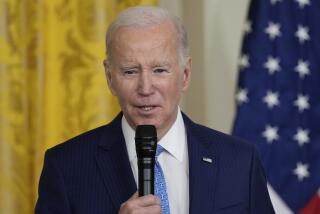Bush Weighs His Threat to Veto Civil Rights Bill : Legislation: The White House says a compromise measure is still possible. Demonstrators call on the President to sign version passed by Congress.
- Share via
WASHINGTON — President Bush was confronted by a last-minute appeal and demonstration by civil rights leaders Friday as he weighed whether to carry through on his threat to veto the civil rights minority-hiring bill.
Presidential spokesman Marlin Fitzwater said there was a long-shot possibility that a compromise could be reached, but he indicated that Bush might simply veto the bill.
“We will staple our new bill to the veto message and send it right back up,” Fitzwater suggested.
However, another official said Friday that the Administration was preparing new proposals for Congress to consider that offer a compromise on the sticky question of whether the bill would result in hiring quotas for minority members.
This official, who spoke on condition of anonymity, said the White House could have a draft ready this weekend to send to Capitol Hill, where members of Congress will be meeting on the federal budget.
The civil rights bill had not been sent to the White House from Congress by the time Bush left to spend the weekend at the presidential retreat at Camp David, Md.
Meanwhile, Sen. James M. Jeffords (R-Vt.), one of five Republicans who met Thursday with Bush to discuss the bill, said he remained optimistic that Congress could draft follow-up legislation that would satisfy the President’s objections.
“I talked to the President again this afternoon,” Jeffords said. “We are optimistic, there has been movement on both sides.” He said Bush set no deadline.
The measure, passed earlier this week, would make it easier for women and minority workers to bring discrimination suits against their employers. The White House contends that the bill would force employers to establish hiring quotas--something that sponsors dispute.
The bill, which is the top legislative goal of national civil rights groups, would reverse a series of Supreme Court rulings that sponsors of the measure say have weakened anti-discrimination protections in the workplace.
Fitzwater said the only hope of heading off a veto was congressional action on separate legislation that would, in effect, modify the civil rights bill to meet the Administration’s objections.
Meanwhile, civil rights leaders demonstrated in front of the White House and sought a meeting with Bush in a last-ditch effort to persuade him to sign the bill.
“We are asking that, before he makes a decision to veto it, that he would meet with the civil rights leadership,” said Benjamin L. Hooks, executive director of the National Assn. for the Advancement of Colored People.
He said that Bush had told him in a telephone conversation Thursday that he was exploring possible ways to avoid a veto, including passage of follow-up legislation modifying the main bill to meet his objections.
Hooks suggested that civil rights leaders were not willing to endorse any compromise that would water down the legislation. But, he said that “there is room for hope” that Bush might reverse himself and sign the bill.
Fitzwater said, “The President certainly wants a strong civil rights bill. He is committed to it. Let’s erase this legal question and make it a true civil rights bill.”
He hinted that Democratic sponsors of the civil rights bill that was passed by Congress were more interested in playing politics with the issue than in ironing out differences with the Administration.
“There’s been nothing to change our belief that it’s a quota bill. The only issue is, is there any way to get it changed at this late date in a way that will be satisfactory,” Fitzwater said.
Hooks was among several hundred chanting demonstrators who gathered outside the White House.
White House congressional liaison Frederick McClure greeted them at the gate, then escorted a small delegation onto the grounds, where he accepted the demonstrators’ written request for a meeting with Bush.
Demonstrators held aloft a large banner that said: “Mr. President, Sign the Civil Rights Bill.”
Hooks said the demonstrators represented “civil rights organizations from all over the nation--women’s groups, Hispanic groups, from the Jewish community, from the black community and from the liberal Republican groups.”
“The consequence of a veto is that President Bush will not be living up to his promise of representing all the people, and that gentler, kinder nation that we were looking for will not come to pass,” Hooks said.
More to Read
Get the L.A. Times Politics newsletter
Deeply reported insights into legislation, politics and policy from Sacramento, Washington and beyond. In your inbox twice per week.
You may occasionally receive promotional content from the Los Angeles Times.










